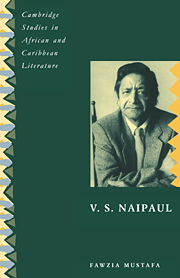5 - The world
Published online by Cambridge University Press: 06 January 2010
Summary
I take possession by turf and twig! Yo corto esta yerba.
(Domingo de Vera, [c. 1592] quoted in V.S. Naipaul, The Loss of El Dorado)When writing about In a Free State, Alastair Niven stated in 1975 that, “I remember commenting after I had read The Mimic Men a few years ago that I doubted if V.S. Naipaul could write another novel.” His prophecy was prompted by a feeling that Naipaul surely could not take his “self-exploratory process” to a more distilled degree of “detached observation and neutrality,” than that novel had achieved. Nevertheless, he continues, reading In a Free State not only disproves his prediction, but also simultaneously reconfirms it because this new collection of both fiction and non-fiction arrives at an “un-Forsterian position of total disconnection” (Niven, p. 69, emphasis added). While Niven attributes much of this stance to a personal investment that has bred a deep despair, what such an argument also demonstrates is that a lack of Forsterian connectedness, ultimately, is apt or necessary for readings that agree that Naipaul's special relation to the Third World can only be understood as an existentialist urgency. At the same time, for Naipaul to have arrived at such a posture is seen as both inopportune and almost adolescent for other critics who smart from Naipaul's insistence upon this need for radical separation.
- Type
- Chapter
- Information
- V. S. Naipaul , pp. 121 - 158Publisher: Cambridge University PressPrint publication year: 1995



